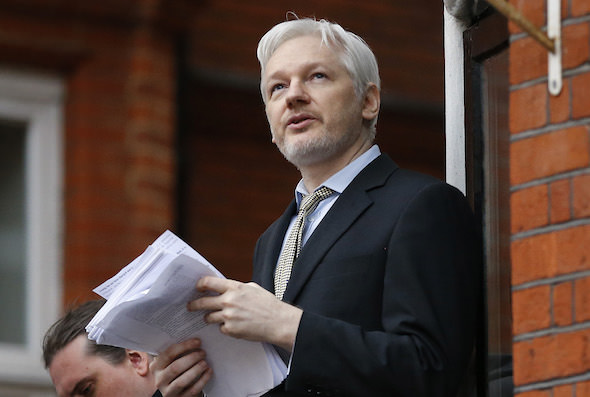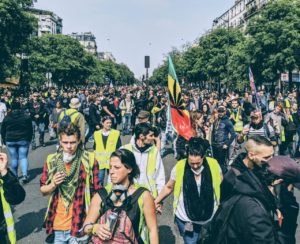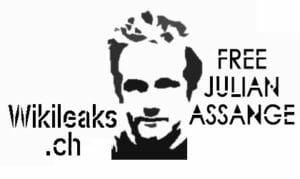Sweden Drops Rape Inquiry Against Julian Assange
The WikiLeaks founder wants to talk with U.K. and U.S. authorities about his legal status now that Swedish authorities have ended their seven-year investigation. WikiLeaks founder Julian Assange, speaking from London's Ecuadorean Embassy in 2016. (Frank Augstein / AP)
WikiLeaks founder Julian Assange, speaking from London's Ecuadorean Embassy in 2016. (Frank Augstein / AP)
WikiLeaks founder Julian Assange, speaking from London’s Ecuadorean Embassy in 2016. (Frank Augstein / AP)
Swedish prosecutors have dropped their seven-year-long investigation of rape allegations against Julian Assange, but the WikiLeaks founder and publisher still faces legal uncertainty in Britain and the United States.
Sweden’s director of public prosecution, Marianne Ny, made the announcement Friday, saying she “has decided to discontinue the investigation regarding suspected rape” because “at this point, all possibilities to conduct the investigation are exhausted.”
“In order to proceed with the case, Julian Assange would have to be formally notified of the criminal suspicions against him,” Ny explained. “We cannot expect to receive assistance from Ecuador regarding this. Therefore, the investigation is discontinued. If he, at a later date, makes himself available, I will be able to decide to resume the investigation immediately.”
Ny added it was “regrettable we have not been able to carry out the investigation” but said “we are not making any pronouncement about guilt.”
The New York Times wrote Friday, “The investigation could be reopened, [Ny] said, if Mr. Assange returned to Sweden before August 2020, the time limit for prosecution specified by the statute of limitations.”
Ecuador granted political asylum to Assange in 2012. He has been living at the Ecuadorean Embassy in London since then.
The investigation started in 2010. After a massive WikiLeaks dump of secret U.S. military reports, two women accused Assange of rape and sexual assault. According to The Guardian, Swedish authorities dropped the sexual assault allegations by one of the women in 2015 “after the statute of limitations expired.”
Assange has always maintained that the rape allegations were false and that he would go to Sweden to face the charges directly if Sweden would guarantee he would not be extradited to the United States.
After Sweden’s decision to end the rape investigation was announced, Assange tweeted: “Detained for 7 years without charge by while my children grew up and my name was slandered. I do not forgive or forget.”
A lawyer representing a woman who claimed Assange raped her said “it is a scandal that a suspected rapist can escape justice and thereby avoid the courts. … My client is shocked, and a decision to drop the case won’t make her change [her assertion] that Assange exposed her to rape,” The Local reported.
Police in London said Assange still faces arrest for failing to meet bail conditions. The Guardian reported that an arrest warrant was issued for Assange after he entered the Ecuadorean Embassy and did not surrender to a court. The BBC reports that punishment for the offense can be up to a year in prison or a fine.
“The Metropolitan police service [MPS] is obliged to execute that warrant should he leave the embassy,” a statement said. “Whilst Mr Assange was wanted on a European arrest warrant (EAW) for an extremely serious offence, the MPS response reflected the serious nature of that crime. Now that the situation has changed and the Swedish authorities have discontinued their investigation into that matter, Mr Assange remains wanted for a much less serious offence. The MPS will provide a level of resourcing which is proportionate to that offence.”
Assange wants to start a dialogue with British authorities to determine his legal status in the United Kingdom and in the United States, another place where authorities want to arrest him.
UK states it will arrest Assange regardless & refuses to confirm or deny whether it has already received an extradition request from the US.
— WikiLeaks (@wikileaks) May 19, 2017
The Ecuadorean government wants Britain to promise not to arrest Assange and to guarantee his safety.
The BBC reports:
[Ecuadorean] Foreign Minister Guillaume Long said that the UK should now grant Mr Assange safe passage, as the European arrest warrant against him “no longer holds”.
“Ecuador welcomes the decision to drop the charges,” Mr Long added, quoted by AFP [Agence France-Presse], while criticizing the time it took Sweden to send an investigator to London to interview Mr Assange.
“Ecuador regrets that it took Swedish prosecutor more than four years to carry out this interview. This was a wholly unnecessary delay.”
Earlier a source at the ministry told the Press Association that Ecuador had “fully co-operated with the Swedish justice system”.
The source added that Ecuador would now intensify its diplomatic efforts with the UK so that Julian Assange could “enjoy his asylum in Ecuador”.
Leaving the Ecuadorean Embassy remains unsafe for Assange until the U.K. provides assurances that he won’t be extradited to the U.S. In April, Attorney General Jeff Sessions said that arresting Assange was a priority for the U.S. government, even though Donald Trump said “I love WikiLeaks” at a rally during the presidential campaign.
The CIA also considers Assange a threat. “It’s time to call out WikiLeaks for what it really is: a non-state hostile intelligence service often abetted by state actors like Russia,” CIA Director Mike Pompeo said during an April 13 public talk at the Center for Strategic and International Studies.
VOTE: Is WikiLeaks an Ethical News Source or ‘Hostile Intelligence Service’?
Through WikiLeaks, Assange has released hundreds of thousands of classified U.S. documents. The materials have exposed possible U.S. war crimes, CIA spying techniques, and corruption of politicians and institutions including the Democratic Party, along with making other disclosures.
WATCH: Julian Assange Accuses Democrats of McCarthyism, Maintains Russia Was Not WikiLeaks’ Source
In February 2016, a United Nations panel found that Assange had been “arbitrarily detained” by the Swedish and U.K. governments since 2010. The U.N. Working Group on Arbitrary Detention at the time recommended “remedies such as release from detention and compensation.”
Assange made a public statement from the balcony of the Ecuadorean Embassy on Friday. “The proper war is just commencing,” he said. “The U.K. says it will arrest me regardless.”
Your support matters…
Independent journalism is under threat and overshadowed by heavily funded mainstream media.
You can help level the playing field. Become a member.
Your tax-deductible contribution keeps us digging beneath the headlines to give you thought-provoking, investigative reporting and analysis that unearths what's really happening- without compromise.
Give today to support our courageous, independent journalists.






You need to be a supporter to comment.
There are currently no responses to this article.
Be the first to respond.